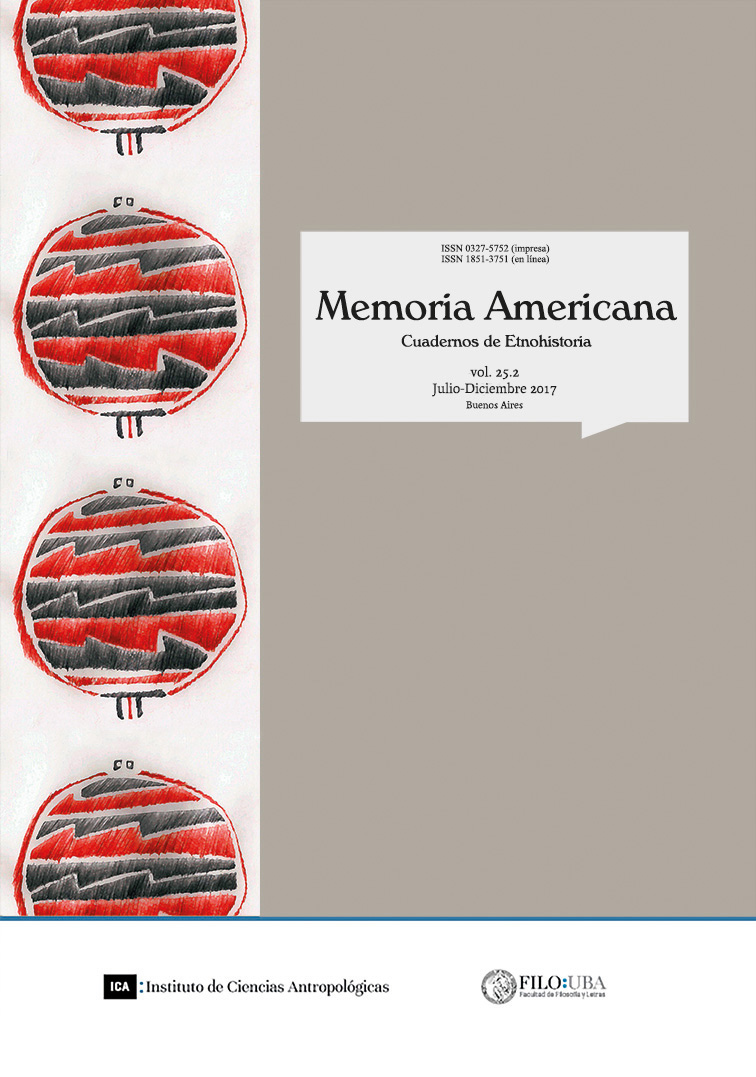Insubordinate, fugitives, and informants: deserters of Spanish and Portuguese garrisons in central South America, c. 1750-1800
Abstract
At the edges of the Iberian empires, military correspondence often refers to the desertion of soldiers and officers. The ubiquity of this phenomenon suggests an association with the squalid working conditions that prevailed in fortifications. This article focuses on late eighteenth-century territorial disputes between the Portuguese captaincy of Mato Grosso and the Spanish provinces of Paraguay, Mojos and Chiquitos, where several detachments and fortifications were located. Without disregarding that poor material conditions cause lots of desertions, this article argues that soldiers and officers’ dissatisfaction with the distribution of honors and prizes was also an important dimension of the phenomenon. Fugitives often imagined that their services and efforts had not been properly recognized and thus decided to negotiate their loyalty as vassals of another prince.Downloads
References
Araujo, R. Malcher de (2000). A urbanização do Mato Grosso no século XVIII: discurso e método. Tese de Doutorado em História da Arte. Lisboa, Universidade Nova de Lisboa.
Archer, C. I. (1983). El ejército en el México borbónico: 1760-1810. México, Fondo de Cultura Económica.
Areces, N. R. (2007). Estado y frontera en el Paraguay: Concepción durante el gobierno del Dr. Francia. Asunción, Centro de Estudios Antropológicos de la Universidad Católica.
Bellotto, H. L. (1979). Autoridade e conflito no Brasil colonial: o governo do Morgado de Mateus em São Paulo, 1765-1775. São Paulo, Secretaria de Estado da Cultura/ Conselho Estadual de Artes e Ciências Humanas.
Block, D. (1994). Mission culture on the Upper Amazon: native tradition, Jesuit enterprise, and secular policy in Moxos, 1660-1880. Lincoln, University of Nebraska Press.
Borreguero Beltrán, C. (2003). Represión e integración de prófugos y desertores en la España del siglo XVIII. Millars: espai i història 26: 111-130.
Chauca García, J. (2004). Los ‘otros’ militares: desertores en la América meridional española del siglo XVIII. Revista de historia moderna: Anales de la Universidad de Alicante 22: 321-342.
Combès, I. y V. Tyuleneva (2011). Paititi: ensayos y documentos. Cochabamba, Instituto de Misionología.
Cooney, J. (2006). “Lealtad dudosa: la lucha paraguaya por la frontera del Paraná: 1767-1777” en Whigham, T. y J. Cooney (eds.), Campo y frontera: el Paraguay al fin de la era colonial: 13-34. Asunción, Servilibro.
Costa, F. D. (2004). “Recrutamento” en Hespanha, A. M. (ed.), Nova história militar de Portugal 2: 68-93. Lisboa, Círculo dos Leitores.
Costa, F. D. (2005). Insubmissão: aversão e inconformidade sociais perante os constrangimentos do estilo militar em Portugal no século XVIII. Tese de Doutorado em Sociologia e Economia Históricas. Lisboa, Universidade Nova de Lisboa.
Elliott, J. H. (2006). Imperios del mundo Atlántico: España y Gran Bretaña en América, 1492-1830. Madrid, Taurus.
Elliott, J. H. (2010). España, Europa y el mundo de Ultramar: 1500-1800. Madrid, Taurus.
García Recio, J. M. (1988). Análisis de una sociedad de frontera: Santa Cruz de la Sierra en los siglos XVI y XVII. Sevilla, Diputación Provincial de Sevilla.
Gómez Pérez, M. C. (1992). El sistema defensivo americano: siglo XVIII. Madrid, Mapfre.
Gutiérrez, R. (1983). Evolución urbanística y arquitectónica del Paraguay: 1537-1911. Asunción, Comuneros.
Halperin Donghi, T. (1982). Guerra y finanzas en los orígenes del estado argentino (1791-1850). Buenos Aires, Belgrano.
Herzog, T. (2015). Frontiers of possession: Spain and Portugal in Europe and the Americas. Cambridge, Massachusetts/ London, Harvard University Press.
Hespanha, A. M. (1995). História de Portugal Moderno: político e institucional. Lisboa, Universidade Aberta.
Hespanha, A. M. (2009). “Por que é que foi ‘portuguesa’ a expansão portuguesa? ou O revisionismo nos trópicos” en Mello e Souza, L. de; M. F. Bicalho y J. F. Furtado (eds.), O governo dos povos: 39-62. São Paulo, Alameda.
Lopes de Carvalho, F. A. (2014). Lealdades negociadas: povos indígenas e a expansão dos impérios ibéricos nas regiões centrais da América do Sul (segunda metade do século XVIII). São Paulo, Alameda.
Marchena Fernández, J. (1982). La institución militar en Cartagena de Indias en el siglo XVIII. Sevilla, Escuela de Estudios Hispano-Americanos.
Marchena Fernández, J. (1992). Ejército y milicias en el mundo colonial americano. Madrid, Mapfre.
Marchena Fernández, J. y M. C. Gómez Pérez (1992). La vida de guarnición en las ciudades americanas de la Ilustración. Madrid, Ministerio de Defensa.
Mayo, C. A. y A. Latrubesse (1998). Terratenientes, soldados y cautivos: la frontera, 1736-1815. Buenos Aires, Biblos.
Mello, C. Figueiredo Pagano de (2009). Forças militares no Brasil colonial: Corpos de Auxiliares e de Ordenanças na segunda metade do século XVIII. Rio de Janeiro, E-Papers.
Moorhead, M. L. (1975). The Presidio: Bastion of the Spanish Borderlands. Norman, University of Oklahoma Press.
Nogueira, S. M. Silva (2004). “‘Esses miseráveis delinqüentes’: desertores no Grão-Pará setecentista” en Castro, C., H. Kraay y V. Izecksohn (eds.), Nova história militar brasileira: 87-109. Rio de Janeiro, FGV.
Peregalli, E. (1986). Recrutamento militar no Brasil colonial. Campinas, Unicamp.
Prodi, P. (1992). Il sacramento del potere: il giuramento politico nella storia costituzionale dell’Occidente. Bologna, Il Mulino.
Radding, C. (2005). Landscapes of Power and Identity: comparative histories in the Sonoran Desert and the Forests of Amazonia from Colony to Republic. Durham, Duke University Press.
Rivarola Paoli, J. B. (2005). La Real Hacienda: la fiscalidad colonial: siglos XVI al XIX. Asunción, Ediciones y Arte.
Saeger, J. S. (1981). Survival and abolition: The Eighteenth Century Paraguayan encomienda. The Americas 38 (1): 59-85.
Tomichá Charupá, R. (2002). La primera evangelización en las reducciones de Chiquitos, Bolivia (1691-1767): protagonistas y metodología misional. Cochabamba, Verbo Divino.
Tormo Sanz, L. (1963). Un ejemplo histórico del ‘mal de altura’ en la guerra de Mojos. Revista de Indias 23 (93-94): 415-452.
Velázquez, R. E. (1977). Organización militar de la Gobernación y Capitanía General del Paraguay. Estudios Paraguayos 5 (1): 25-69.
Weber, D. J. (2005). Bárbaros: Spaniards and their savages in the Age of Enlightenment. New Haven, Yale University Press.
Copyright (c) 2017 Memoria Americana. Cuadernos de Etnohistoria

This work is licensed under a Creative Commons Attribution-NonCommercial-ShareAlike 4.0 International License.
Los derechos de autor son cedidos a Memoria Americana. Cuadernos de Etnohistoria, no obstante los autores podrán recuperarlos y reproducir su trabajo en otros medios o formatos previo envío de solicitud al Comité Editorial. En tales casos, deberá citarse a Memoria Americana. Cuadernos de Etnohistoria como primera publicación del trabajo y el mismo queda bajo una licencia Creative Commons CC BY NC SA 3.0 Attribution- Non Commercial -ShareAlike 3.0, la cual provee libre acceso inmediato a sus contenidos pues se rige por el principio según el cual hacer disponible -en forma gratuita- la investigación al público fomenta un mayor intercambio de conocimiento a nivel global.
Los autores deberán remitir el siguiente formulario de cesión de derechos y compromiso de originalidad:
Cesión de derechos y compromiso de originalidad
Al Comité Editorial de Memoria Americana, Cuadernos de Etnohistoria
Por la presente declaro ser el autor del trabajo titulado (nombre del artículo), el mismo es original y propio y no ha sido publicado en ningún formato o soporte con anterioridad.
En caso de ser aceptado para su publicación en Memoria Americana. Cuadernos de Etnohistoria (número/año) cedo los derechos editoriales que me corresponden por el aludido artículo para su publicación en todos los formatos que posea la mencionada revista.
Si quisiera publicar este artículo a través de otro editor o en otro lugar me comprometo a solicitar el correspondiente permiso por escrito al Comité Editorial de Memoria Americana. Cuadernos de Etnohistoria. De ser afirmativa la respuesta del Comité Editorial me comprometo a lo siguiente:
- especificar lugar, editorial y fecha de la primera publicación del artículo en la nueva publicación
- realizar esta republicación sólo luego de transcurridos un año calendario desde la fecha de la presente nota de cesión de derechos
FIRMA
Aclaración











